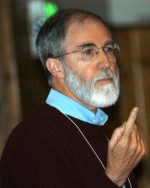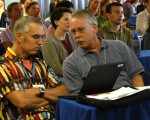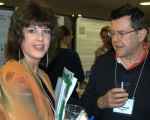NSF at the LTER All-Scientists Meeting
NSF was well represented at the ASM in Estes Park, CO, this September, with seventeen staff attending from across the Foundation – Biological Sciences (BIO), Geosciences (GEO), Office of Polar Programs (OPP), Social, Behavioral & Economic Sciences (SBE), and the Office of International Science & Engineering (OISE). NSF representatives were involved in numerous presentations and discussions, including a plenary session talk by Dr. James Collins, Assistant Director of Biological Sciences, on “Origin, Development and Future of the LTER Network.”
LTER site renewals
During spring 2006, proposals from 10 LTER sites were reviewed for renewal of funding. Each of these sites—Bonanza Creek (BNZ), Cedar Creek (CDR), Florida Coastal Everglades (FCE), Jornada Basin (JRN), Georgia Coastal Ecosystem (GCE), Harvard Forest (HFR), Luquillo (LUQ), Virginia Coastal Reserve (VCR), Santa Barbara Coastal (SBC), and Sevilleta (SEV)—will be renewed in 2007.
Preparations for the 2007 LTER site reviews
Next year, 11 LTER sites will undergo midterm site reviews. A renewal team, consisting of five independent, external reviewers will visit each site and conduct the review. The reviews will begin in April at the Baltimore Ecosystem Study (BES), continue throughout the year with Kellogg Biological Station (KBS), Hubbard Brook (HBR), Niwot Ridge (NWT), Bonanza Creek (BNZ), Arctic (ARC), Moorea Coral Reef (MCR), California Current Ecosystem (CCE), Central Arizona – Phoenix (CAP), and Plum Island Estuary (PIE), and end in January 2008 with McMurdo Dry Valleys. Currently, NSF is working to recruit the renewal teams.
Recent briefings by LTER Science Task Force at NSF
On October 25-26, 2006, members of the LTER Science Task Force (Scott Collins, Barbara Benson, Dan Childers, and Ali Whitmer) met with representatives from NSF to brief them and discuss developments in the LTER decadal strategic planning process. The Science Task Force (STF) held open briefings with Biological Sciences (BIO), Geosciences (GEO), Office of Polar Programs (OPP), Social, Behavioral, and Economic Sciences (SBE), and the Working Group on Environmental Observing Networks. The Advisory Committee for the STF met concurrently and provided additional feedback to both NSF and the STF regarding their plans. The STF and NSF will continue these discussions throughout the year, including at the LTER Mini-Symposium at NSF on March 8th, 2007, where the discussion themes will be highlighted.

 Enlarge this image
Enlarge this image

